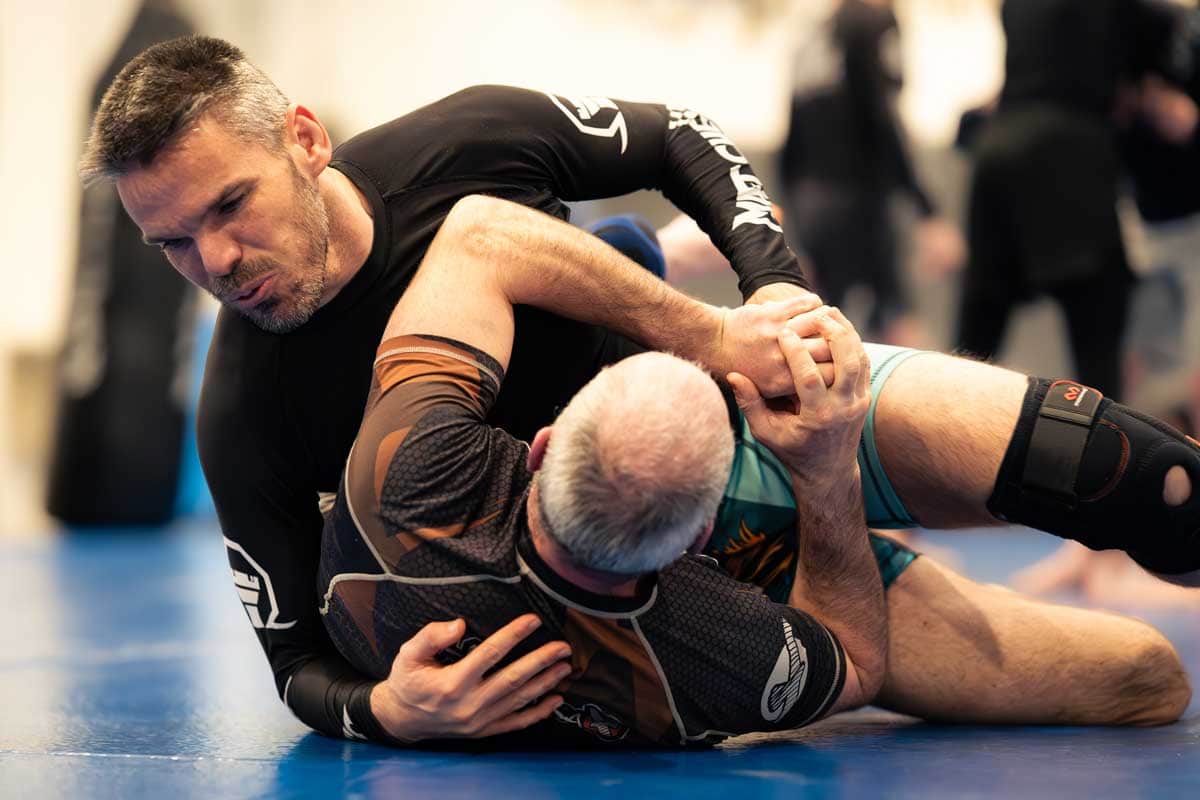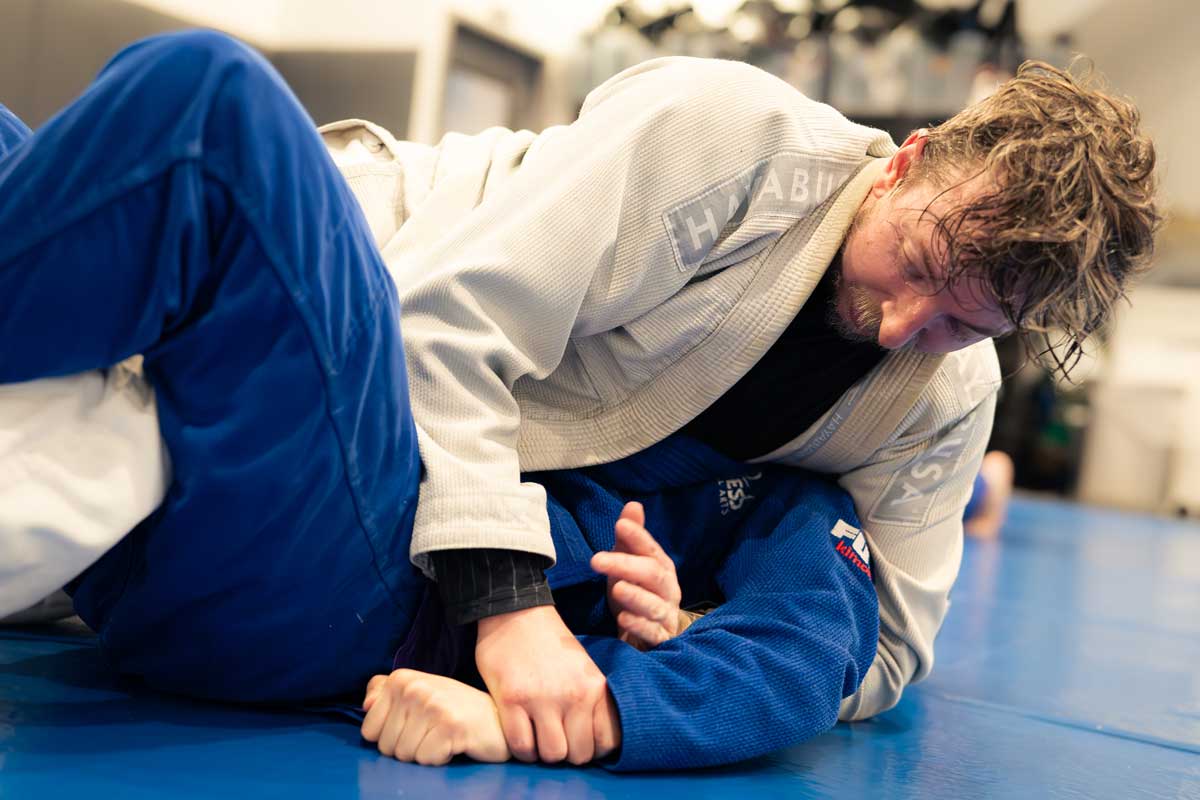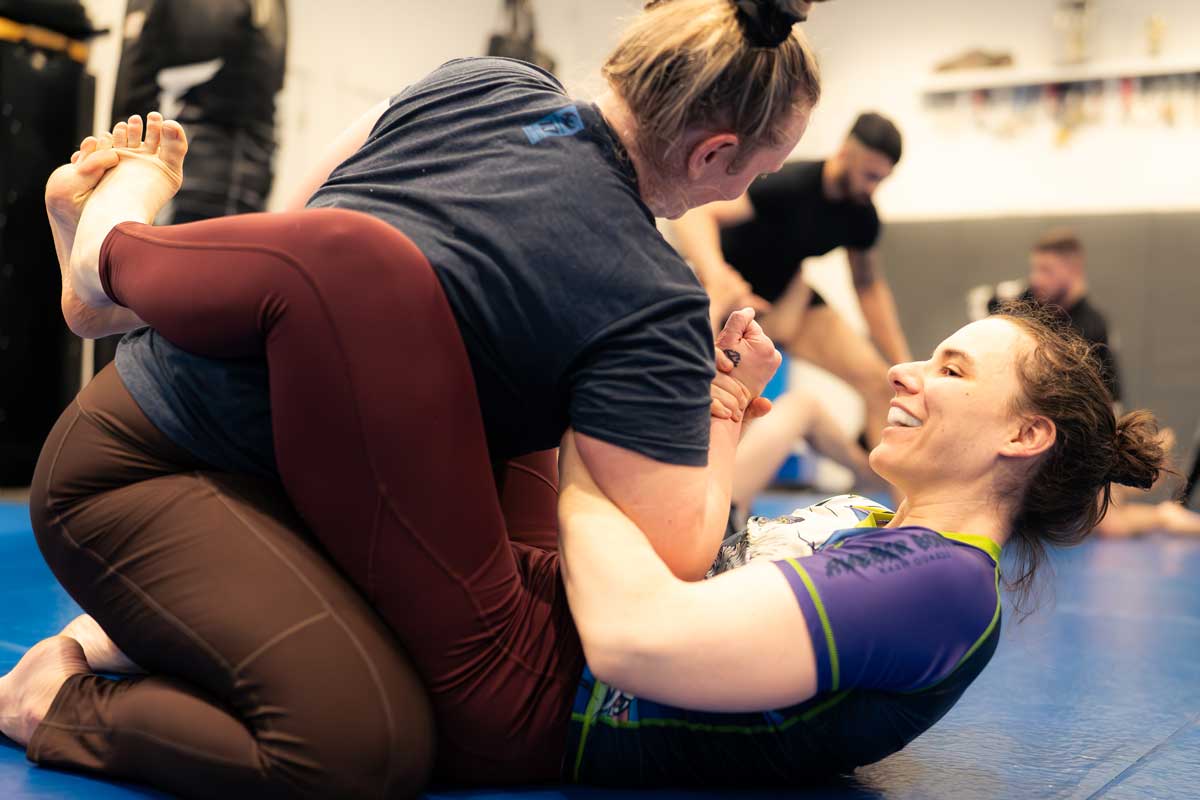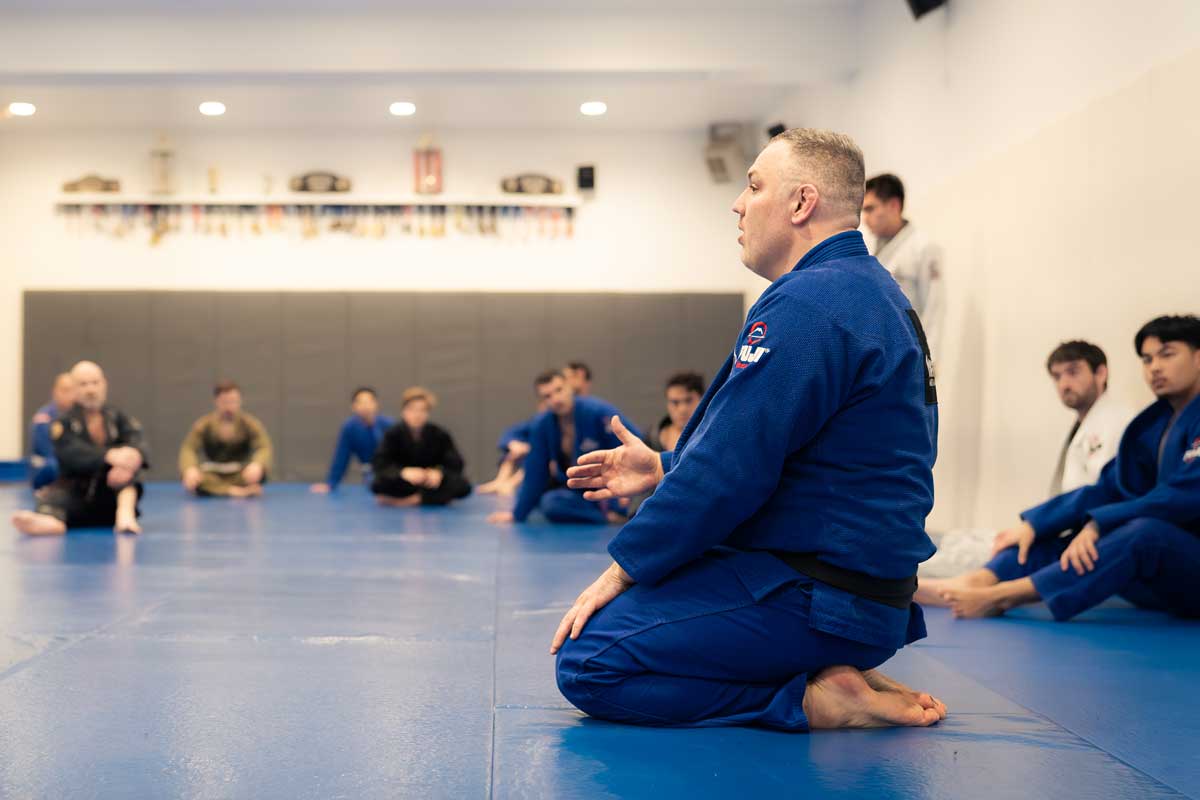BJJ Class Schedule
Sunday
-
Open Mat
-
Monday
-
Jiu Jitsu
-
-
Jiu Jitsu (Gi)
-
Tuesday
-
Muay Thai Morning Training
-
-
Jiu Jitsu
-
-
Jiu Jitsu (Gi)
-
Wednesday
-
Jiu Jitsu
-
-
Jiu Jitsu (No Gi)
-
Thursday
-
Muay Thai Morning Training
-
-
Jiu Jitsu
-
-
Jiu Jitsu (No Gi)
-
Friday
-
MMA and BJJ Morning Training
-
-
Jiu Jitsu
-
-
Open Mat
-
Saturday
-
Jiu Jitsu Fundamentals
-
-
Open Mat
-
See a time that works?
Dedicated Class For
Gi
We can trace modern BJJ back to Japanese jiu-jitsu and judo — both use a gi.
Why would you train in one today, though?
A gi is like training wheels for grappling. It helps you understand grip, control and how the human body reacts. Learning these principles in a gi dramatically improves communication between instructor and athlete, helping you learn BJJ as a whole, faster.
No-Gi
Why would you train no-gi BJJ?
It’s the best way to learn how to hold down a slippery opponent. When you can hold down someone with no gi on, it’s that much easier to do so in a gi.
The reduced friction and slipperier grips in no-gi mean training and sparring both tend to happen at a faster pace. This makes for great reflex, coordination and scrambling skill development.
Ultimately, they complement each other. Learning one will help you develop as a martial artist in the other.
And they’re both fun, so why not do both?
Why Train BJJ?
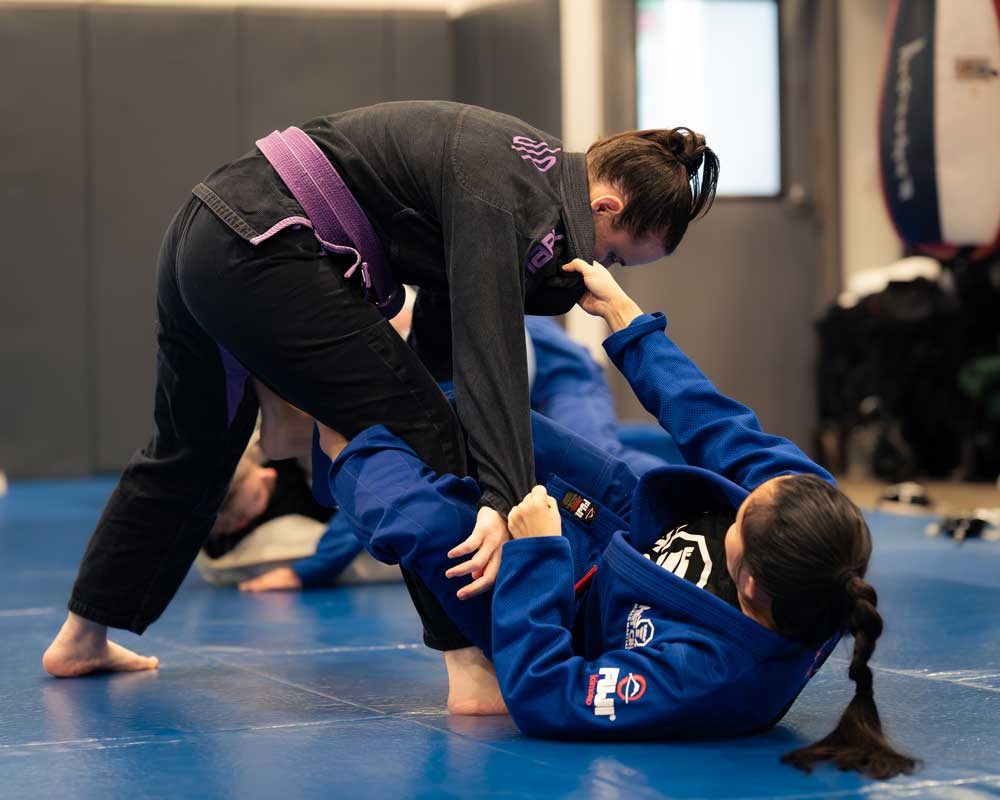
Fitness
Gyms are great, but why not become stronger, faster and more coordinated while making new friends and learning new, practical skills?
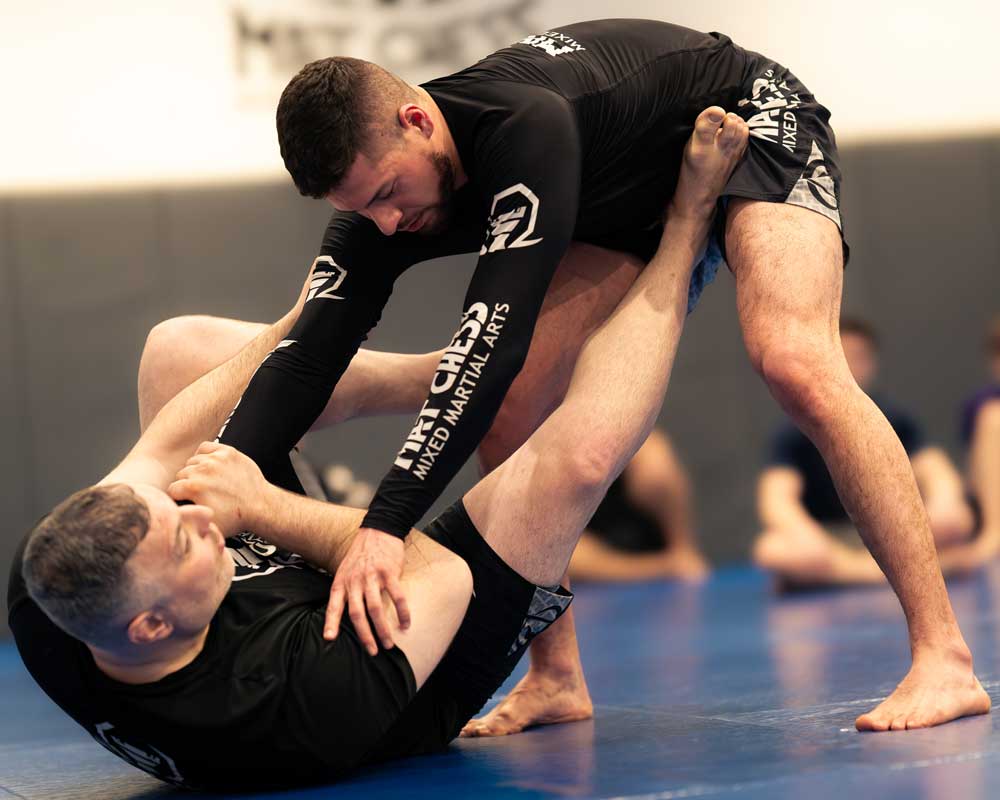
Competition Opportunities
Looking for a fresh way to challenge yourself? Train to compete! We compete as a team in regular tournaments throughout the state, and our members test themselves at dozens more monthly.
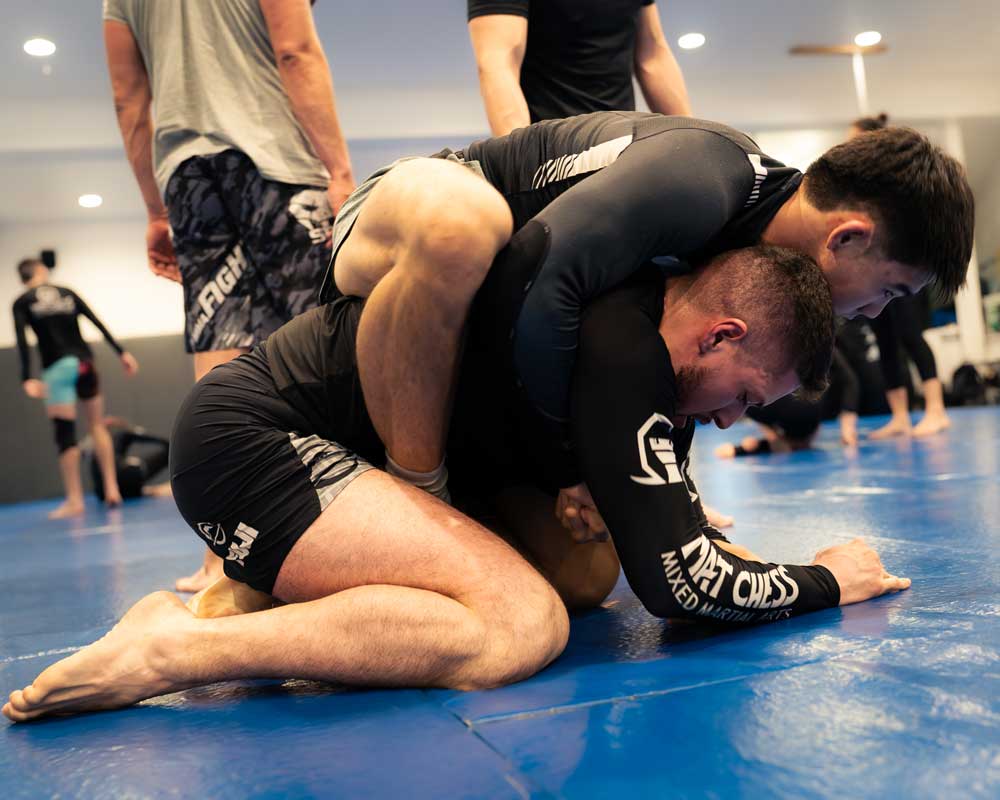
Self-Defense
It’s a fact that most fights end up on the ground. If you’re ever in a situation where you need to defend yourself, learning how to handle yourself on the ground couldn’t be more important.
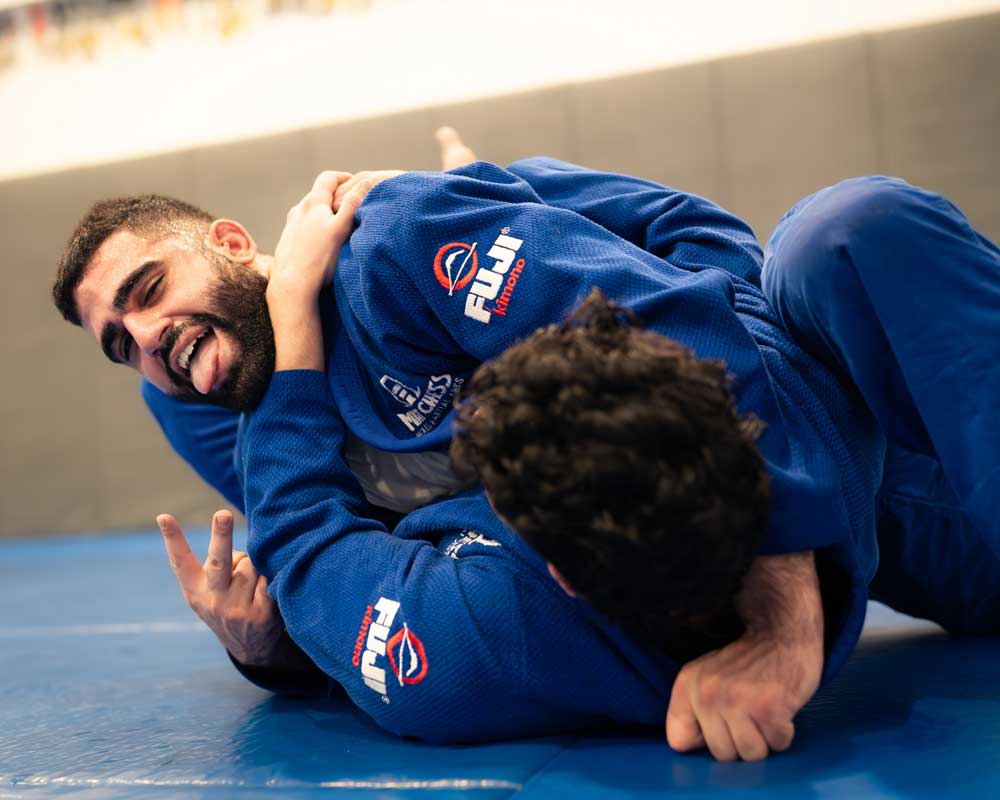
Community
Remember how much fun after-school activities like band or football were? It’s the same here. Join a community of friends and teammates who train together, encourage one another and grow together.
More Experienced and Looking for a BJJ Team in Seattle?
We base our training curriculum on our competition schedule, which includes three phases:
- A six-week camp in preparation for tournament, focused on fundamentals
- Two to three weeks of work reflecting on tournament performance
- An innovation phase, where we add new techniques to further develop technique and strategy before returning to competition
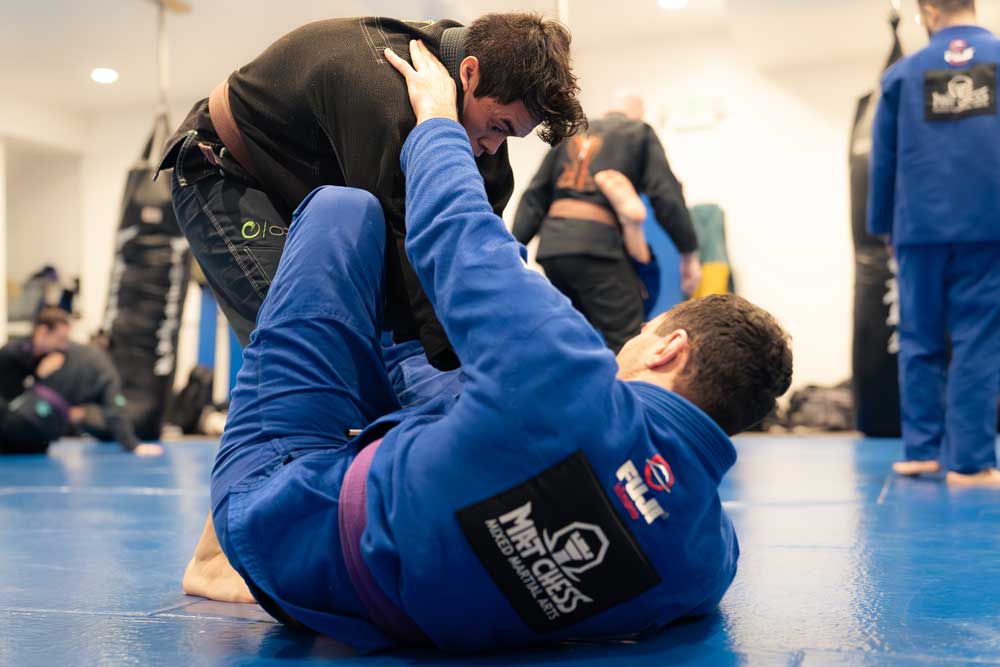
Local Competition
Three times yearly we compete at The Revolution, the largest BJJ tournament in the Pacific Northwest. We’ve placed in the top three as a team many times over the years as a single unaffiliated gym — an impressive and rare feat for a single gym.
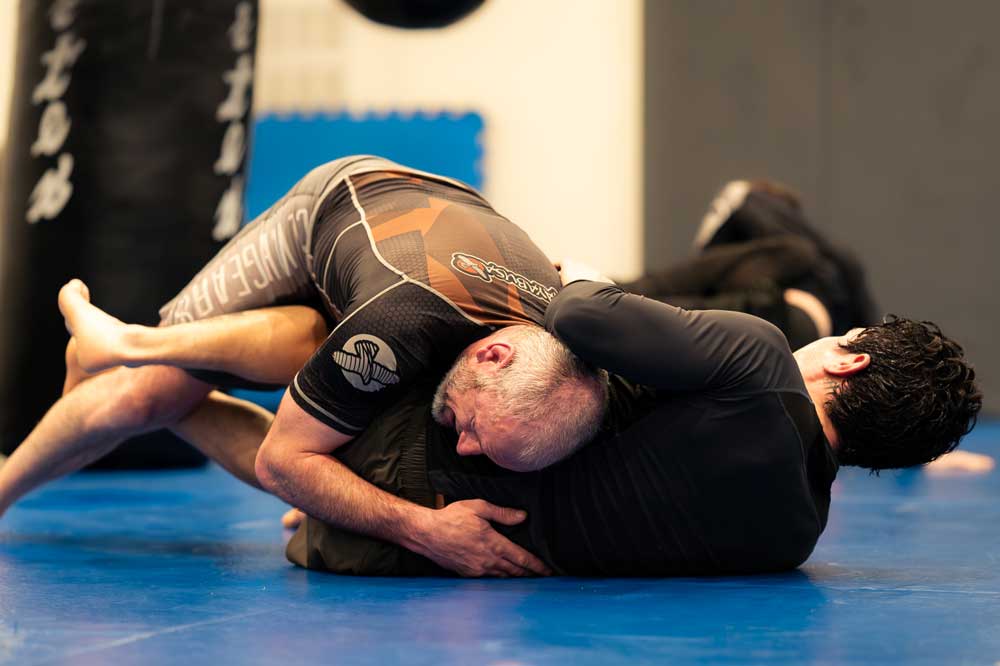
National and International Competition
We regularly send students to successfully compete in IBJJF tournaments nationally and internationally, including Worlds, No-Gi Worlds, Pan Ams, European Championships, ADCC Trials and other large national tournaments. We’re proud to be an IBJJF-certified academy.
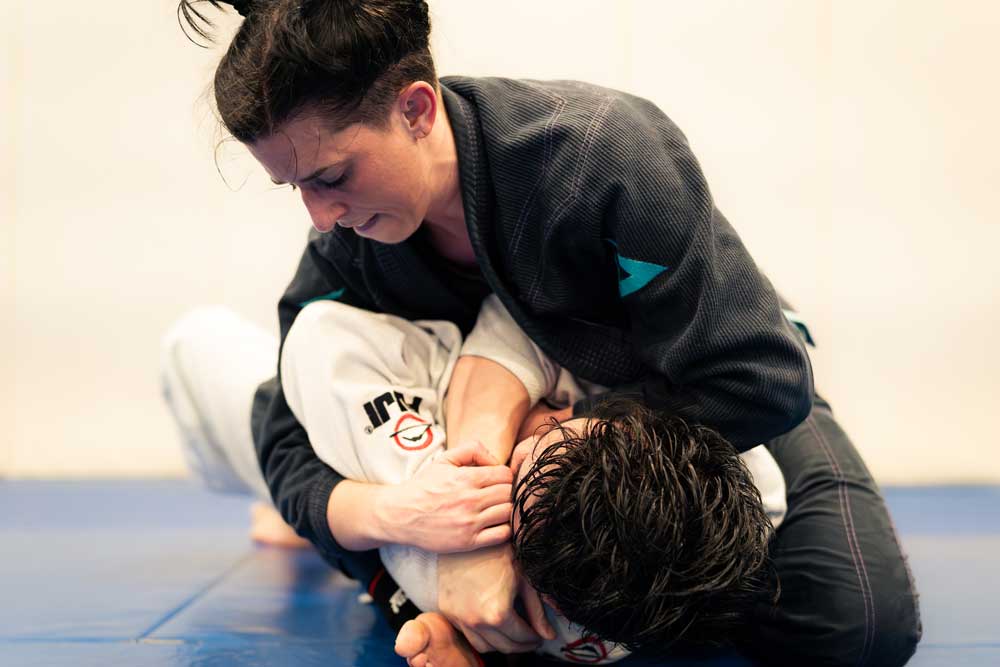
Superfights
We regularly have students participate in local professional superfights and Fight To Win matches as they progress competitively.
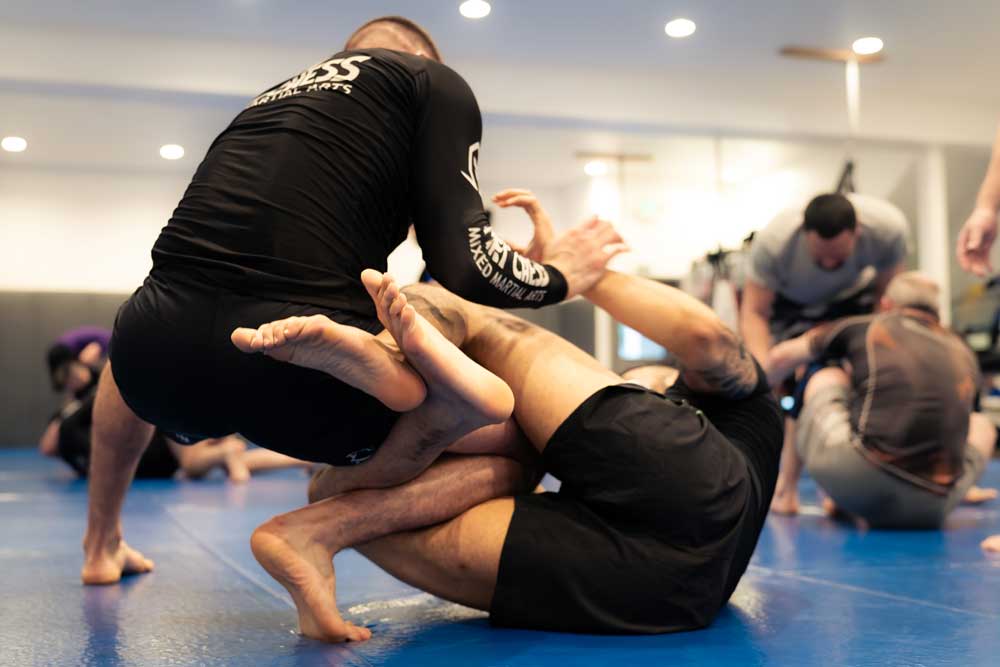
Competition Preparation
We take a unique, holistic approach to competition preparation that has maximized our results since our 2011 inception. We always have students participate in our six-week Tournament Preparation Camp for The Revolution three times yearly.
Our preparation includes working with coaches to come up with a comprehensive, individualized game plan from feet to floor. We also work with students on their competition mindset and confidence. Our distinct preparation is at the core of our long-standing history of competition success.
We also work with individuals and groups for their national and international competition to ensure they’re mentally, physically and spiritually prepared to perform at their best.
BJJ Classes Coached by Professor Andrew Perkins
Andrew Perkins started his martial arts journey in 2003 and became a Dave Ginsburg Black Belt in Brazilian jiu-jitsu. He has been teaching BJJ for over 13 years and has shaped some of the best grapplers in the Pacific Northwest.
He loves training with his students daily so that he knows exactly what he needs to do from a curriculum perspective to push his students’ games forward.
Before coaching, he taught. With a master’s degree in education and roughly a decade of classroom experience, his BJJ instruction mirrors how professors assemble and teach classroom curricula — because we know that’s how people learn.
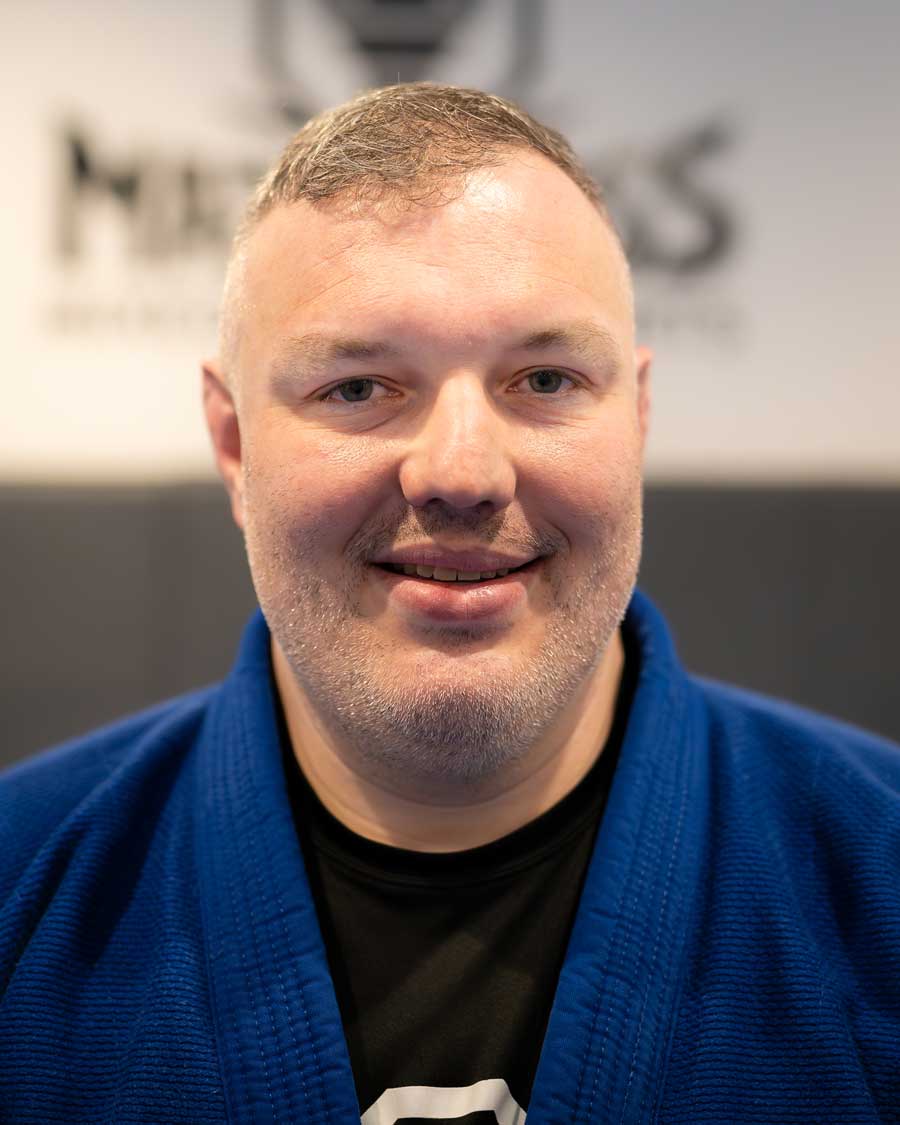
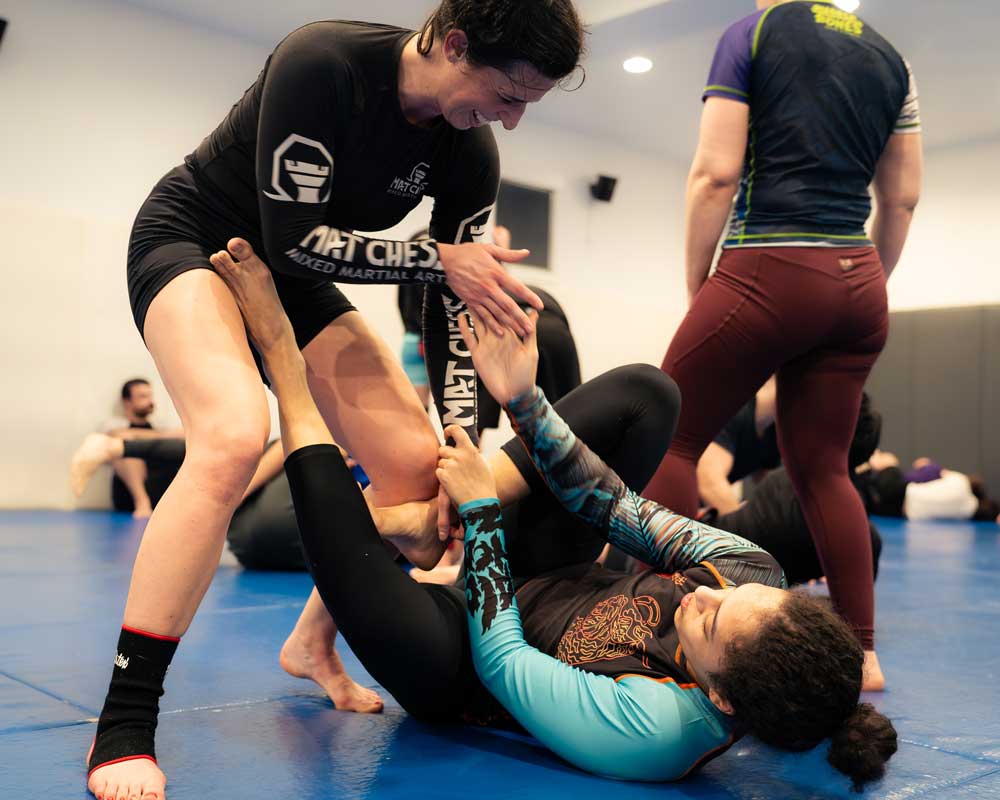
Class Structure
Too many gyms structure BJJ education as practicing a bunch of secret moves, hoping you “just get better” at them over time.
We know that this style of “teaching” would never be acceptable in any academic classroom because it doesn’t work. That’s something experts have studied, tested and proven.
At Mat Chess MMA, you learn through proven, established systems and units that both work and are easier to understand, learn and apply.
Our Class Structure Teaches in Two Ways
- We systematize BJJ into blocks of concepts to practice and master over rotating two- to three-week periods. This includes factors like all major guard positions, escape systems, fundamental sweeps and submissions through undermining and tension, how to control an opponent from each dominant position and more.
- We structure practice specifically to build and retain knowledge and skill over time. A normal class looks like this:
- Flow warm-ups. Flowing is a round at 50% speed max. It’s a slow warm-up using the actual movements we’ll be training, slowed for safety. This gives you a good opportunity to do brainwork on technique.
- Technique work. This always includes a review of past techniques and builds on it with new techniques. It includes drilling technique, then semi-live rounds that give you the opportunity to not only use the technique with (moderate) resistance but also practice getting into position to use that technique.
- Open sparring. We go into live rounds, changing partners every 5 minutes for about 30 minutes.
- Stretching and cooldown.
Hear Why Our Members Love Mat Chess
Learn Why We Have More Than 150 Five-Star Reviews on Google
FAQ
The internet is rife with opinions on this one! We do a 50-50 split for a reason.
Gi emphasizes a more distanced guard game, and the gi can be “training wheels” for developing tension (push and pull control). You can then apply this control in both gi and no-gi training. No-gi emphasizes a more butterfly and chest-to-chest game, helping develop pressure and lifting guards.
Both are highly valuable. To create well-rounded grapplers, we train both!
In the first six months of training two to three times weekly, students typically go through three major projects.
The first is a breathing project. When people start, they typically hold their breath, causing them to fatigue quickly. Learning how to be calm under pressure and breathing through it not only help you be less tired but also allow you to think and use the techniques you’re learning.
The second is escaping from all five dominate positions in jiu-jitsu. When you start, you find yourself in poor positions regularly. Learning how to escape allows you to work on the other aspects of jiu-jitsu.
The third is learning at least one movement from all jiu-jitsu positions. This allows you to move entirely through efficient jiu-jitsu movements and replace your intuitive movements.
For jiu-jitsu, all you need is a gi that fits you well. We sell gis that help support the gym instead of Jeff Bezos, and we can help you get fitted.
First, don’t worry in the slightest about being new to martial arts! Training people from zero is what we’re known for.
As with all things in life, the more you do, the better you get. All classes are beginner friendly. Fundamentals classes are also very helpful because they go over the art’s most essential movements. However, you should supplement them with standard classes as well.
To compete, you need to show competence in each jiu-jitsu position and a willingness to compete. We have each competitor work with the instructor on tournament mindset, strategy and game plan.
For The Revolution, the largest BJJ tournament in the PNW, we have a complete 6-week camp in preparation three times annually. We have many other students who compete regularly in other tournaments, both local and abroad. It’s our goal to support the competitors’ goals.
We have a long-standing tradition of competition and have sent students all around the globe to compete!
We think about this question incessantly! It’s our goal as instructors to maximize your progress, given your time commitment.
The simple answer for you as a student is to come to class as often as you can! We design our class structure to make the most of your time investment with 90-minute to 2-hour classes. That’s also because we don’t need to short-change sparring or technique.
Our curriculum is similar to an academic curriculum. We teach in weekly blocks so that you aren’t learning techniques that don’t go together but rather learning in logical systems. Additionally, we add resistance to make the techniques sparring-ready and then spar five-plus rounds in every class.
In fact, we’ve been focused on maximizing student learning since we opened in 2011!
All sports carry a certain risk of injury. In our personal experience, we’ve been injured more frequently playing basketball than training martial arts.
There’s a common misconception that people suffer injuries because of submissions. However, if you’re in a good gym environment (like Mat Chess) and have good training partners who care about each other’s progress and well-being, injuries from submissions are highly uncommon.
Injuries happen most commonly from dynamic, explosive and surprising movement. While we do all we can to prevent injury, it’s always a possibility — albeit an unlikely one.
Parking is easy! You have an abundance of free street parking surrounding our building.
All you need are clothes you feel comfortable working out in. If you’re trying out a class, we have community gear that’ll get you through the day.
Absolutely not! In fact, 95% of the people who come in have never trained before. We’re renowned for teaching you from zero.
Open mat is noninstructional time when people come in to drill, spar, roll and work on their own martial arts projects. It’s a great opportunity to push yourself while having a good time with the community.
Our kids’ class accommodates ages 5 to 15. We start integrating students into adult class around high school, and our oldest student is 71 years old!
Overwhelmingly, the answer is to come to class! We design our class structure to maximize your progress, so doing the things needed to free time to attend class is often the most important part of maximizing your learning.
Your coaches also work with you on your personal development. Each Mat Chess coach has excellent experience working with you on your unique goals.
The best time to start is now! Don’t worry in the slightest about not being in the shape that you want to be in.
And don’t waste time thinking you should work on your general fitness to start your martial arts journey. Martial arts will help with that!

